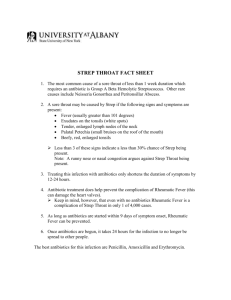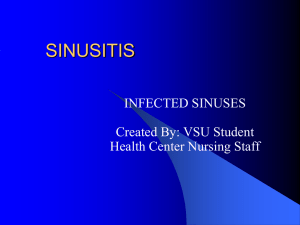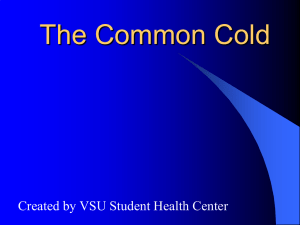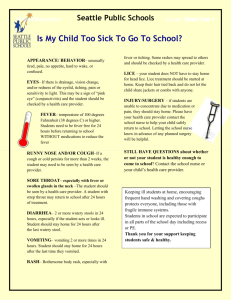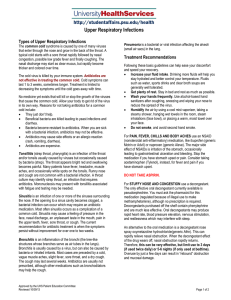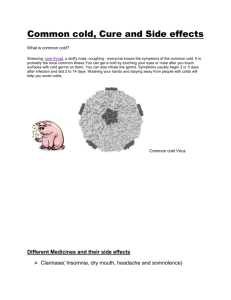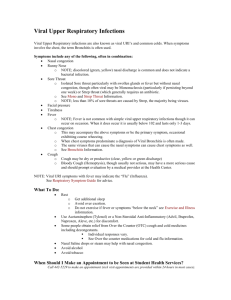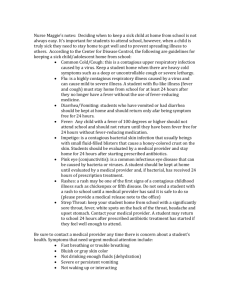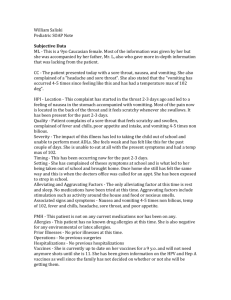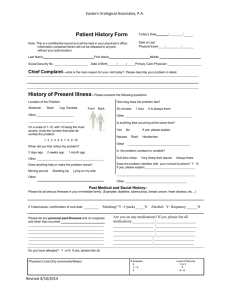For Illness Caused by a Virus
advertisement
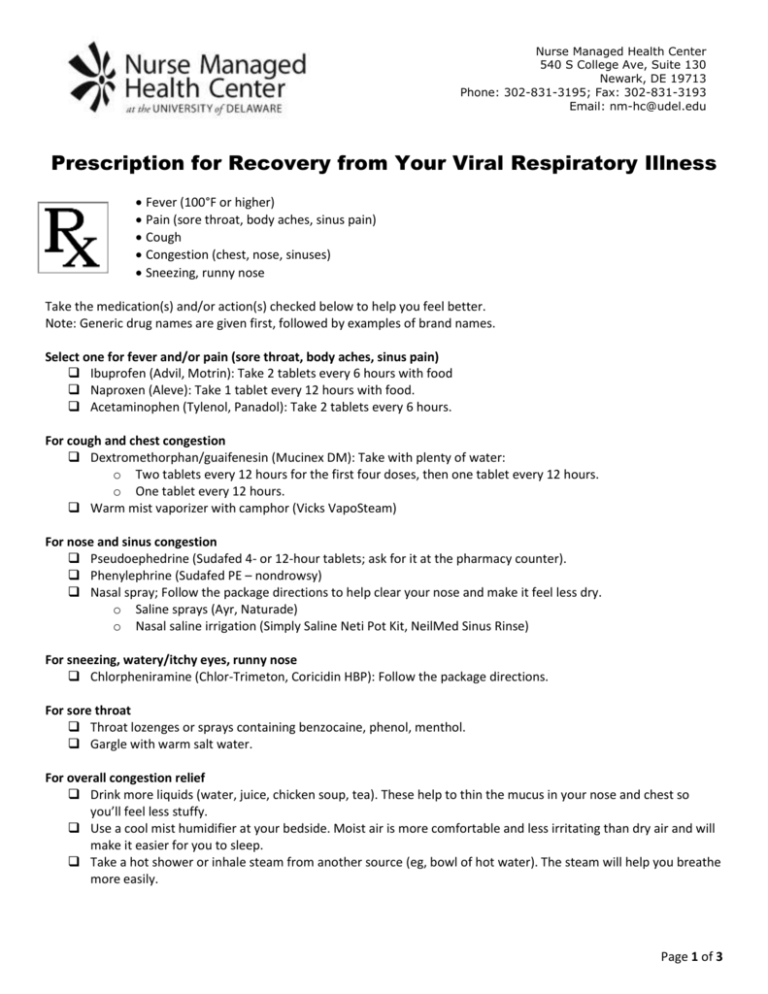
Nurse Managed Health Center 540 S College Ave, Suite 130 Newark, DE 19713 Phone: 302-831-3195; Fax: 302-831-3193 Email: nm-hc@udel.edu Prescription for Recovery from Your Viral Respiratory Illness Fever (100°F or higher) Pain (sore throat, body aches, sinus pain) Cough Congestion (chest, nose, sinuses) Sneezing, runny nose Take the medication(s) and/or action(s) checked below to help you feel better. Note: Generic drug names are given first, followed by examples of brand names. Select one for fever and/or pain (sore throat, body aches, sinus pain) Ibuprofen (Advil, Motrin): Take 2 tablets every 6 hours with food Naproxen (Aleve): Take 1 tablet every 12 hours with food. Acetaminophen (Tylenol, Panadol): Take 2 tablets every 6 hours. For cough and chest congestion Dextromethorphan/guaifenesin (Mucinex DM): Take with plenty of water: o Two tablets every 12 hours for the first four doses, then one tablet every 12 hours. o One tablet every 12 hours. Warm mist vaporizer with camphor (Vicks VapoSteam) For nose and sinus congestion Pseudoephedrine (Sudafed 4- or 12-hour tablets; ask for it at the pharmacy counter). Phenylephrine (Sudafed PE – nondrowsy) Nasal spray; Follow the package directions to help clear your nose and make it feel less dry. o Saline sprays (Ayr, Naturade) o Nasal saline irrigation (Simply Saline Neti Pot Kit, NeilMed Sinus Rinse) For sneezing, watery/itchy eyes, runny nose Chlorpheniramine (Chlor-Trimeton, Coricidin HBP): Follow the package directions. For sore throat Throat lozenges or sprays containing benzocaine, phenol, menthol. Gargle with warm salt water. For overall congestion relief Drink more liquids (water, juice, chicken soup, tea). These help to thin the mucus in your nose and chest so you’ll feel less stuffy. Use a cool mist humidifier at your bedside. Moist air is more comfortable and less irritating than dry air and will make it easier for you to sleep. Take a hot shower or inhale steam from another source (eg, bowl of hot water). The steam will help you breathe more easily. Page 1 of 3 For faster recovery Rest. Stay home from work or school or take a break from your usual activities To avoid spreading your illness Try not to touch your eyes, nose, and mouth. If you do, wash your hands before touching anything or anyone else. Don’t let anyone use a dish or utensil you’ve used until it’s been thoroughly washed with hot soapy water. Antibiotics: When You Need Them, When You Don’t and What to Take When You Don’t Check if your symptoms are likely caused by viruses or bacteria Illness Common Symptoms Bronchitis Common cold (upper respiratory infection) Ear infection (acute otitis media) Pneumonia Sore throat Strept throat Cough, clear or green mucus, no or low fever (100°F101°F), occasional wheezing, chest soreness, short of breath Runny nose, nasal stuffiness and congestion, facial pressure, cough, chills, body aches, low fever (100°F101°F), scratchy throat, sneezing, headache, watery eyes, tiredness Ear pain; red, bulging eardrum; fever (≥ 100°F); discharge from ear; fluid may collect in inner ear, causing feeling of fullness in ear(s), muffled hearing Cough, short of breath, fever (≥ 100°F), chest pain when taking a deep breath, tiredness, bluish lips from low oxygen in the blood Throat burning/pain, hard to swallow. Symptoms of a cold (see above) may also be present. Sore throat, fever (≥101°F-101°F), white patches on tonsils, enlarged lymph nodes, upset stomach; there is usually no cough, runny nose, or diarrhea. Viral Bacterial X Rarely X X X X X X X If your illness is probably Viral: make an appointment to see your health care provider if you don’t feel better or if you feel worst after a few days. Bacterial: make an appointment to see your health care provider as soon as possible. For Illness Caused by a Virus There are many helpful OTC medicines and things you can do at home to improve your symptoms and make you feel better. OTC medicines Ibuprofen, naproxen, and acetaminophen can lower fever and relieve pain (sore throat, body aches, sinus pain). Throat lozenges and sprays can ease throat pain and irritation. Decongestants, such as Sudafed* and Sudafed PE*, help relieve a stuffy nose and sinuses. Saline nasal sprays (eg, Ayr, Naturade) or nasal saline irrigation (Simply Saline Neti Pot Kit, NeilMed Sinus Rinse) can “unstuff” and sooth your nose. Muculytics and antitussives, found in Mucinex DM or Robitussin DM, can thin and loosen chest congestion and reduce coughing. *If you have high blood pressure or diabetes, ask your health care provider or pharmacist about safe decongestant choices for you. Home remedies Cool mist humidifiers may be used to moisten the air and make it more comfortable to breathe so you can rest and sleep. A warm mist vaporizer, especially with a medicated inhalant (eg, Vicks VapoSteam), may relieve chest congestion and cough. Liquids (water, juice, soups, tea) thin mucus and may help you feel less congested. Drink liquids without a lot of caffeine. Rest is important. Take naps and if you have a fever, stay home from work or other activities. Page 2 of 3 Tips to avoid spreading your illness Wash hands frequently with soap and water or hand sanitizer. Don’t let anyone eat or drink from the same dishes or use the same utensils you’ve used. Cover your mouth with a tissue when sneezing or coughing; dispose of used tissues carefully. If you don’t have a tissue, sneeze or cough into your sleeve. Stay home when you’re sick. Especially avoid the very young, the elderly, and others who are sick. Antibiotics Do’s and Don’ts If you receive a prescription for antibiotics, Here are some important things to know: Do finish all the pills you receive; don’t stop taking the medicine when you begin to feel better and don’t save some for “next time” If you don’t finish all the medicine, some bacteria survive and your infection may come back. Don’t take someone else’s prescription. Unless you’re a health care provider, you can’t diagnose yourself; you don’t know if what you have is the same as what someone else has. Don’t share your prescription with someone else. See the two items above. Don’t double the next dose if you forget to take a dose. It’s not safe to take more medicine at once than your health care provider prescribed. If you forget to take a dose, then take it as soon as you can. And remember… Don’t take antibiotics for viral infections. They’re only effective against bacteria, not viruses, so they won’t help you get better from a viral infection. You don’t need them. Why is it so important not to take antibiotics when you don’t need them? Although antibiotics kill bacteria, a few will survive. These bacteria are antibiotic resistant and can grow, multiply, and spread to other people. Sometimes antibiotics kill “good” bacteria that prevent other infections. This can cause other illnesses to develop, such as vaginal or oral fungus infections and Clostridium difficile colitis. There’s no reason to risk these side effects if you have a viral infection. Eventually, an antibiotic that once worked to treat bacterial infections no longer does because the bacteria have become resistant to that antibiotic. Illnesses can last longer, causing more doctor visits and hospital stays; stronger drugs with more serious side effects must be used; and in some cases, people die from antibioticresistant bacterial infections. The best way to reduce the number of bacteria that are becoming resistant to antibiotics is to take antibiotics only when they’re needed – in other words, to treat bacterial infections. Page 3 of 3
